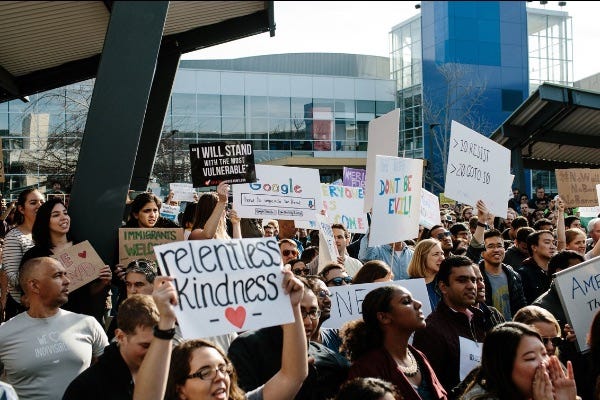Catching up
Open CoLab
get insights | make change
This newsletter has fallen a bit behind schedule. It launched as a monthly at the beginning of the year, and I managed to keep pace through the spring. Then the summer hit.
I wish I could say the long break was spent on a beach, but the reality is the opposite: a flood of interesting projects came my way, and while I carved out a few hours here or there to keep up with the latest, it was never enough to get a full edition out. In fact, this edition has been in production for so long that it originally included a thoughtful piece from MIT Media Lab’s Joi Ito.
I’d love to get back to a monthly schedule, but let’s not make false promises. If my project load stays at current levels, this might become a quarterly.
In the meantime, here's a preview of what's below.
Snapshot:
New partnerships, especially among donors
Equity-based research, from Chicago to the Global South
Activism may change tech from the inside (but mostly the outside)
Journalism: accountability, relevance, or both?
Movement updates: the latest lessons from Puerto Rico, Hong Kong, Indivisible, and more
Books: gathering, culture, and innovation

Water buffalo and its egret friends. Photo by Geoff Whalan (CC BY-NC-ND 2.0).
Partnerships, likely and unlikely
George Soros and Charles Koch founded a think tank on their common opposition to American interventionism. (No, it doesn’t mean Charles Koch is good now.)
Facebook’s announcement that it was launching a currency called Libra raised a lot of eyebrows, especially for the involvement of Mercy Corps. The NGO’s leadership argues that global digital money transfers have great potential in humanitarian contexts, but detractors like Dragana Kaurin call their involvement a fig leaf for a corporate-controlled currency. Michael Kimani points to the risks of neo-colonialism in Africa.
Hillary Pennington discusses a recent study showing that donor collaboratives work better for donors than for grantees. Her advice applies to all forms of grant-making: give multi-year, general operating support; take an ecosystem approach; and have a clear investment thesis, goals, and shared expectations.
Speaking of donor collaboration: What impact has the Giving Pledge had? Marc Gunther reviews the evidence and… it’s not great.
Meanwhile, Michael Sieff spoke to Rakesh Rajani of Co-Impact—the donor collaborative created, in some ways, to provide a channel for the new funding coming online from the Giving Pledge. Co-Impact aims for systems change via “big bets”. (Though I have to disagree with Sieff’s characterization of systems change as entailing either big bets or portfolio-based small bets. Power-based approaches fall into neither category.)
Co-Impact recently put out a “Handbook” that communicates the why, what, and how of its work in unusually clear terms for a donor.
Equity-based research
Research with—not research on: Two different pieces popped up on communities that often find themselves researched by others. The Governance in Conflict Network has shared a series of blog posts (plus a manifesto!) on transnational collaboration in field research—basically, how “Northern”-based academics work with research assistants in the “South”.
In a similar vein, impact investor Chicago Beyond has published a guide on equity-based approaches to research titled, appropriately, Why Am I Always Being Researched?
Who you cite and how matters, Rigoberto Lara Guzmán and Sareeta Amrute tell us: How to Cite Like a Badass Tech Feminist Scholar of Color

Google employees protesting the Muslim ban in January 2017 (Photo: Jason Henry, NYT/Redux via WIRED.)
Tech activism
WIRED’s August cover story on “Three Years of Misery Inside Google, the Happiest Company in Tech” tells the rise of activists (on both the right and the left) within the company. Every part of it is fascinating, but I was most interested by the dynamic of opening up: while the implicit deal used to be “keep your disagreements within the family”, inside and outside activists have started working together to pressure the company around immigration, defense contracts, gender, and more. It's almost like being accountable only to people you can fire isn't enough.
Related note: in the first-ever strike at the Seattle headquarters, Amazon Employees for Climate Action had 900 members planning to walk out last Friday, with a list of specific demands on the company.
What is journalism for?
Bob Garfield writes in the Columbia Journalism Review with a call to his fellow journalists: “Let’s save America” (more at the Purple Project for Democracy).
Maslow’s hierarchy of information needs, and why today’s journalism is feeding us an unbalanced diet: too much investigation and political analysis, but not enough help navigating everyday life for most readers. (Or put another way: “There is no Wirecutter for the poor.”)
I find it's not just about balance, but about how the functions reinforce one another. Journalists imagine that holding the powerful accountable makes them relevant to readers, but maybe it goes the other way: you have to be relevant to readers' lives first before you can fulfill your accountability mandate.
Though a year old now, I’ve just come across this talk from danah boyd on the ways fringe groups manipulate the media. Among other points, she emphasizes the need to for news outlets to be better rooted in their communities.
Learning from movements
In Puerto Rico, people’s assemblies are channeling the energy that forced the governor’s resignation earlier this summer.
Indivisible navigates national-local tensions (who hasn’t, amirite?) and the question of whether to endorse a presidential candidate.
Tactics from the Hong Kong protestors: be water, open-source leadership, supply line sign language, crowdfunding, and more.
And if you want to go deeper, Maciej Ceglowski has full details on how the protestors used technology.
Bonus: Grassroots donations supply protestors in Hong Kong (short video)
Marcia Chatelain writes, five years after Ferguson, about the evolution of Black Lives Matter.
After bringing new energy and new strategy to the climate movement, and helping put a new policy goal (the Green New Deal) on the national agenda, what’s next for the Sunrise Movement?
Potpourri
Paradoxical movements: opening government while closing civic space? Saskia Brechenmacher explores the evidence, pointing to the “open-washing” happening in some countries, and the efforts to narrowly define openness in terms of transparency in other countries.
Of all the things philanthropy (and social change more broadly) needs to do differently, Srik Gopal calls for three core shifts: from project to systems; from results to hypotheses; and from planning to learning.
Last one on philanthropy: Tate Williams calls for judging philanthropy not just on impact, but on how well it shifts power.
Andy Martin has some good thoughts on how social change actors are moving from strategic planning to strategic thinking, including opening up the we they’re thinking about strategy. (Self-promotion alert: I appreciated many of Martin's ideas in part for their alignment with my recent piece in SSIR on agile strategy.)
The Narrative Initiative has been doing some fascinating work over the last few years, but one piece I especially appreciated was this very clear definition of narrative change and related terms. (Drawing inspiration from Priya Parker’s book—see below—the Narrative Initiative also recently shared reflections on gathering.)
Is your team a well-oiled machine? Or something more like a living being? Organizational design firm NOBL shares a great list of eight organizational metaphors, from a book by Gareth Morgan.
Successful organisations aren’t ones that adopt an ‘Agile mindset’. Successful organisations are ones that adopt a feminist, queer, anti-establishment, progressive mindset — one that is flexible, experimental, pushes boundaries, self-organises, and acts in service of community.
— Hanna Thomas on why “agile” just means “feminist”
Books, books, books
Now that your beach reading is behind you, here are a few recommendations to check out for the Fall (or Spring, depending on your hemisphere):
The Art of Gathering (Priya Parker) - something broader than a facilitation handbook, on how to plan and host gatherings of all kinds.
The Culture Code (Daniel Coyle) - full of insights on the softer sides of organizational culture; like so many business books, it's structured around the typical case studies of various companies.
Where Good Ideas Come From (Steven Johnson) - draws heavily on evolutionary ideas in explaining how innovation happens, both in the biological and manmade worlds, and concludes that market forces are actually less conducive to innovation than non-market-based cooperation.
That's all for now. I'll have to re-think the format and process of this newsletter going forward, but hope to get future editions out more regularly. Until then, you know how to reach me.
- Dave



